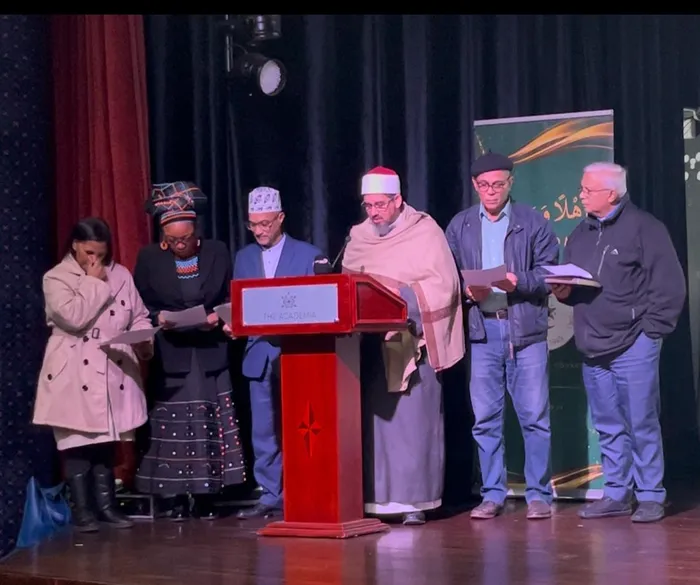Faith and civic leaders unite to confront Cape Flats gun violence crisis

Faith leaders and activists pledge to reclaim streets from gang violence, led by moral regeneration and grassroots organising.
Image: Mandilakhe Tshwete
In response to a deadly surge of shootings across Cape Town, interfaith leaders and civic organisations have vowed to lead a grassroots moral and structural regeneration campaign to address what they describe as a “constitutional, moral and humanitarian emergency”.
The gathering, convened by the Muslim Judicial Council (MJC), the Cape Crime Crisis Coalition (CCCC), the Western Cape Council of Churches (WCCC), and other civil society partners, followed a wave of gun violence that left numerous people dead in recent weeks.
MJC President Sheikh Riad Fataar said the gathering was prompted by the deteriorating security crisis across the Cape Flats and broader Western Cape.
“In line with our earlier statement on 7 July, where we condemned the proliferation of organised criminal activity, the circulation of illicit arms and drugs, and the resultant violation of constitutional rights to life, security and dignity, the MJC has now engaged directly with state authorities in an urgent bid to arrest the deepening spiral of social decay,” Fataar said.
He confirmed that a high-level engagement was held at the MJC offices with South African Police Services (SAPS) regional commissioner Lieutenant General Thembisile Patekile, senior SAPS management, and Members of Parliament from the police oversight committee.
Fataar said the MJC “welcomed the frank and constructive tone of the dialogue” and extended appreciation to those “who recognised the gravity of the moment”.
He reiterated that the unchecked violence was not just a policing crisis, but “a moral, constitutional and humanitarian emergency”.
“As articulated in Section 72 of the Constitution, the state bears a positive and non-negotiable duty to respect, protect, promote and fulfil the rights of all persons, especially the most vulnerable.”
He added: “What we see is not only the consequence of gang warfare, but the result of decades-long structural abandonment and institutional erosion. The right to life, dignity, and safety is not aspirational; it is constitutional. When that right is systematically denied, we are compelled by faith and law to act with urgency, clarity and unity.”
Cape Crime Crisis Coalition (CCCC) founder Dr Llewellyn MacMaster warned that society must adopt “multi-focal lenses” when analysing the crisis.
“A lot of the time, we’re restricted. Sometimes we must zoom in on the details, but also widen our lens to see the national and international systemic issues. We are the crisis committee, but we must ask: Why are we still in a crisis?” he said.
MacMaster called on religious institutions to reclaim their role in addressing what he termed a deep moral and ethical collapse in South African society.
“We’ve handed over the responsibility for moral regeneration to the government. Remember the last time it was led, it was under Jacob Zuma. We must take back that responsibility. We need courageous leadership, leaders who are not seduced by photo ops with politicians. If we think our role is to take pictures at the table, we are fooling ourselves.”
He urged collaboration across faith groups, even without state funding or resources.
“We are building this movement every day without money. But we must reach consensus and act. As the African proverb goes: ‘If you want to go fast, go alone. If you want to go far, go together.’”
Community leader Dean Ramjoomia issued a challenge to faith groups, calling for inward accountability: “You talk about crime and criminality, but are you dealing with the criminal in your home? Our society is psychosocially dysfunctional. It’s easier to deal with a criminal than with the brokenness that produces them.”
Ramjoomia also pointed to overlooked trauma among men: “More men are victims of sexual violence than we admit. But we only see men as perpetrators and villains. There is no healing for the brokenness of men in this society.”
Philippi-based leader Nandi Vangqa-Mgijima called for deepened political education and mobilisation among the working class, particularly around the historical roots of gangsterism.
“Gangsterism was a system created by the apartheid government. But it seems now that this very system is being reinvented under the democratic dispensation. We need to understand these root causes, the socioeconomic ills that continue to confront our communities.”
She criticised the government’s use of commissions of inquiry as ineffectual and wasteful: “They are often useless and drain resources that should be going to the very communities that suffer most. We need to be informed when we make our demands, not symbolic, but strategic.”
Former Western Cape top police officer Jeremy Vearey stressed that the faith sector must now take full leadership of the country’s moral regeneration agenda, and not simply play a supporting role to the state.
“The religious community is no longer leaving moral regeneration to the state, policing, or spiral crime prevention programmes,” said Vearey.
“They’ve now come to the point where they are leading; they’ve decided to lead their campaign for regeneration.”
But he cautioned that this shift must come with state support.
Vearey said the collective energy of interfaith leaders, civic groups, and community organisers must now be redirected back into neighbourhoods.
The meeting concluded with a renewed commitment from faith and civic leaders to take charge of the moral regeneration agenda, not just as support to state efforts, but as a leading force.
mandilakhe.tshwete@inl.co.za
Related Topics: